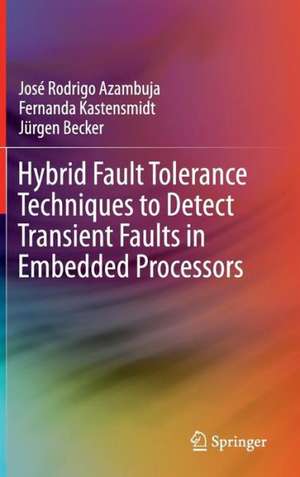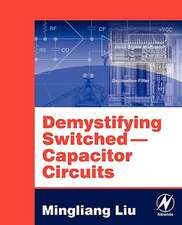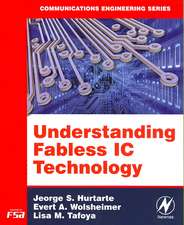Hybrid Fault Tolerance Techniques to Detect Transient Faults in Embedded Processors
Autor José Rodrigo Azambuja, Fernanda Kastensmidt, Jürgen Beckeren Limba Engleză Hardback – 28 iul 2014
| Toate formatele și edițiile | Preț | Express |
|---|---|---|
| Paperback (1) | 631.53 lei 6-8 săpt. | |
| Springer International Publishing – 10 sep 2016 | 631.53 lei 6-8 săpt. | |
| Hardback (1) | 637.59 lei 6-8 săpt. | |
| Springer International Publishing – 28 iul 2014 | 637.59 lei 6-8 săpt. |
Preț: 637.59 lei
Preț vechi: 750.11 lei
-15% Nou
Puncte Express: 956
Preț estimativ în valută:
122.01€ • 130.46$ • 101.72£
122.01€ • 130.46$ • 101.72£
Carte tipărită la comandă
Livrare economică 18 aprilie-02 mai
Preluare comenzi: 021 569.72.76
Specificații
ISBN-13: 9783319063393
ISBN-10: 3319063391
Pagini: 112
Ilustrații: XVIII, 94 p. 37 illus., 11 illus. in color.
Dimensiuni: 155 x 235 x 15 mm
Greutate: 0.34 kg
Ediția:2014
Editura: Springer International Publishing
Colecția Springer
Locul publicării:Cham, Switzerland
ISBN-10: 3319063391
Pagini: 112
Ilustrații: XVIII, 94 p. 37 illus., 11 illus. in color.
Dimensiuni: 155 x 235 x 15 mm
Greutate: 0.34 kg
Ediția:2014
Editura: Springer International Publishing
Colecția Springer
Locul publicării:Cham, Switzerland
Public țintă
ResearchCuprins
Introduction.- Background.- Fault Tolerance Techniques for Processors.- Proposed Techniques to Detect Transient Faults in Processors.- Simulation Fault Injection Experimental Results.- Configuration Bitstream Fault Injection Experimental Results.- Radiation Experimental Results.- Conclusions and Future Work.
Textul de pe ultima copertă
This book describes fault tolerance techniques based on software and hardware to create hybrid techniques. They are able to reduce overall performance degradation and increase error detection when associated with applications implemented in embedded processors. Coverage begins with an extensive discussion of the current state-of-the-art in fault tolerance techniques. The authors then discuss the best trade-off between software-based and hardware-based techniques and introduce novel hybrid techniques. Proposed techniques increase existing fault detection rates up to 100%, while maintaining low performance overheads in area and application execution time.
• Discusses the effects of radiation on modern integrated circuits;
• Provides a comprehensive overview of state-of-the art fault tolerance techniques based on software, hardware, and hybrid techniques;
• Introduces novel hybrid fault tolerance techniques for reconfigurable FPGAs and ASICs;
• Performs fault injection campaigns by simulation, bitstream fault injection, and radiation experiments;
• Enables readers to use techniques with lower performance degradation, area occupation, and memory usage.
• Discusses the effects of radiation on modern integrated circuits;
• Provides a comprehensive overview of state-of-the art fault tolerance techniques based on software, hardware, and hybrid techniques;
• Introduces novel hybrid fault tolerance techniques for reconfigurable FPGAs and ASICs;
• Performs fault injection campaigns by simulation, bitstream fault injection, and radiation experiments;
• Enables readers to use techniques with lower performance degradation, area occupation, and memory usage.
Caracteristici
Discusses the effects of radiation on modern integrated circuits Provides a comprehensive overview of state-of-the art fault tolerance techniques based on software, hardware, and hybrid techniques Introduces novel hybrid fault tolerance techniques for reconfigurable FPGAs and ASICs Performs fault injection campaigns by simulation, bitstream fault injection, and radiation experiments Enables readers to use techniques with lower performance degradation, area occupation, and memory usage Includes supplementary material: sn.pub/extras











